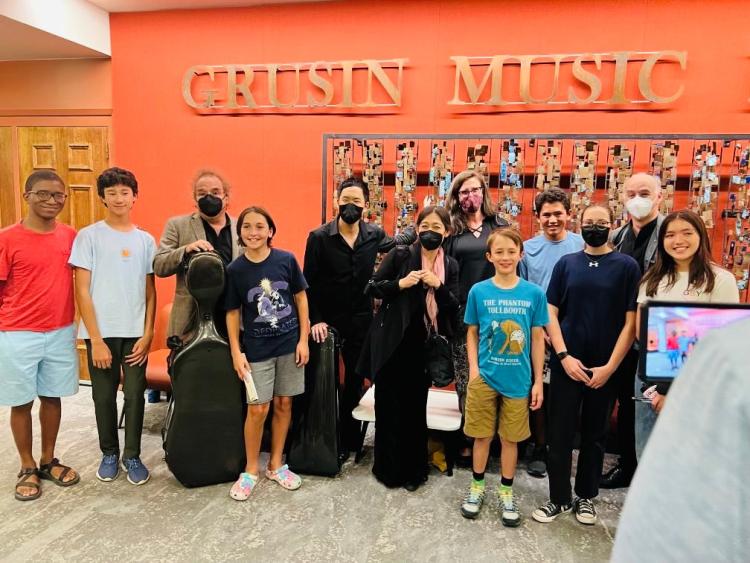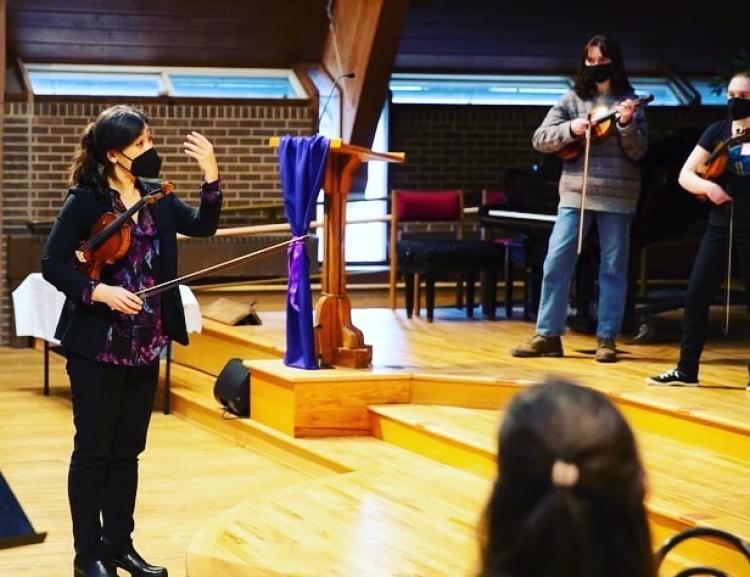Takács Quartet launches CU Series, expands community engagement

The musicians of the world-renowned, Grammy Award-winning ensemble are widely recognized for their musical qualifications and achievements. Violinists Edward Dusinberre and Harumi Rhodes, violist Richard O’Neill and cellist András Fejér are all veterans of the international classical music scene; and all four of them—artists-in-residence at our college—regularly perform for audiences worldwide, holding their own on the most prestigious, storied stages.
Even so, the quartet is committed to collaborating with others to make their performances extra special, particularly in our local community.
“We love playing for our home crowd in Boulder,” says Rhodes, who recently returned from a busy, international tour with the quartet. “The energy in the concert hall is a huge part of our music making. Audience members might not always realize this, but they are actively contributing to what is happening on stage.
“Having a ‘home’ audience of loyal Takács fans is a huge honor and when we hear the buzz of conversation among friends in the hall, it makes the concert experience more than just about the music itself. It’s about the relationships formed through the shared love of music.”
Nurturing and drawing inspiration from those relationships is a major focus for the quartet as they look to 2023. Coming up on Jan. 8 and 9, they will perform Haydn’s String Quartet Op. 77 No. 2, Beethoven’s String Quartet Op. 132 and Fanny Mendelssohn’s String Quartet in E-flat Major. These concerts will celebrate several milestones for the group, including the release of new Fanny and Felix Mendelssohn and Haydn string quartets recordings, and the publication of Dusinberre’s new book, Distant Melodies: Music in Search of Home.
The January concerts will also signify a new push from the quartet to deepen and expand its relationships with fans. Beginning in 2023, the Takács Quartet’s new CU Series will allocate 16 free tickets for each Monday night concert to engage new audience members.
“Over the summer, I spoke with our friends and colleagues at the College of Music and CU Presents about how we can continue to serve our loyal patrons alongside cultivating relationships with possible new audience members, especially young music students in our community,” Rhodes explains. “The opportunity to grow our audience is exciting to us—and we think engaging with young musicians in our local community is a beautiful place to start.”
Reaching out to young musicians isn’t a new priority for the quartet, now entering its 48th season. Most recently, Takács members worked closely with members of youth orchestras to instill a sense of engagement and investment in orchestral music among young local musicians. In September, the quartet invited alumna Emily Bowman—artistic director of the Greater Boulder Youth Orchestras—and 16 of her students to attend one of the ensemble’s Monday night performances.
“We loved having them in the audience and talking with them afterwards,” says Rhodes. “Their observations, comments, impressions and questions were full of curiosity and insight—and their presence in the hall added a joyful energy to the concert.”

Such efforts are slated to continue. The quartet has invited Boulder Suzuki Strings Executive Director Amy Gesmer-Packman and 16 of her students to attend their concert on Jan. 9. And In March and April, the quartet will welcome Executive Director of the Colorado Music Festival Elizabeth McGuire and Center for Musical Arts Education Director Kathy Kucsan, along with 16 students, to join the audience.

Indeed, it’s part of what makes playing at CU Boulder unique for a group of musicians that’s welcomed with open arms in classical music venues around the world. For all the excitement and glamor that comes with traveling nationally and internationally, there’s something special about returning home.


